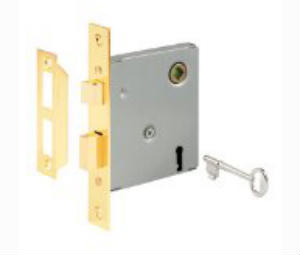The Mortise Lock, Secure and Reliable
At one time the mortise lock was pretty much standard for external doors.
However
with the invention of the bored cylindrical lock by W. Schlage in 1909,
the mortise gradually fell out of favor in most parts of the world.
This was because the bored cylindrical lock is cheaper to produce and
does not take as much skill to fit, making a cost saving for the
construction industry.
Today the mortise is making quite a comeback.
Architects are
frequently specifying these locks for both commercial and residential
exterior doors.
Homeowners too are switching over to the mortise when replacing locks or external doors.
There
appears to be two main reasons for this lock’s return to popularity.
Firstly, many people find the lock being hidden inside the door to be
more aesthetically pleasing.
Secondly, and much more important, is the increased security that a mortise lock offers.
Mortise
is a carpentry term meaning a slot or recess cut out of a piece of
wood, so that another piece with a matching projection can be fitted
into it, making a tight joint (mortise and tenon joint.)
A mortise type
lock similarly fits into a recess cut into the edge of a door, as
opposed to a Rim Lock that is fitted onto the surface of a door.
The Right Lock For The Job.
As with anything else there are different grades of mortise
lockset.
Some are intended purely for inside use, as privacy locks for
bathrooms and bedrooms. Naturally this grade of lock will not provide
you with anything like adequate security for external doors.
For suitable protection of your home, fit exterior grade locks to all your external doors, (including the door through from your garage.)
The
American National Standards Institute tests and grades locks as to
their ability to provide security for both commercial and residential
properties. ANSI 1 being the highest grade and ASNI 3 the lowest.
Be
sure that the lock that you fit is suitable for the thickness of the
door, which should not be less than one and three quarter inches.
There
is a good selection of door hardware available to compliment your
mortise lockset, with finishes in satin bronze, satin nickel, brass,
copper, oil rubbed bronze etc.
Fitting A Mortise Lock – Use A Professional.
Fitting a mortise type lock into a door that has not already had such
a lock fitted is no easy task. It is not a job for the average
do-it-yourself enthusiast and best left to a professional who has the
correct skills and tools.
The recess has to be cut out with
precise accuracy. If cut too deep or too shallow the lock will not fit
correctly and will either fail to operate at all, or not operate
correctly.
A poorly mortised, or badly aligned recess will weaken the
door and therefore reduce its security.
Replacing a mortise is not nearly as tricky but the replacement
lock must be the exact same size. Fit a strike box in preference to a
strike plate and use screws of at least 3 inches.
Using shorter screws
may mean that you are only fitting the strike box to the frame dressing
and not into the door frame itself, doing so would potentially make
the box a weak point.
Opt For A Deadbolt For The Best Protection.
For the best security you need a deadbolt mortise lock. Deadbolts require
a key to lock and unlock from the outside.
The bolt shoots out from the
edge of the door into a strike plate, or a strike box fitted into the
door frame. The deadbolt should extend at least ¾ inch, 1 inch is
better.
From the inside a double cylinder deadbolt lock will need
the key to lock or unlock.
A single cylinder type will have a knob, or
thumb catch, to lock or unlock from the inside.
Your door is
likely already fitted with some sort of latch, but locksets are
available with both a deadbolt and a latch. Stand alone mortise latches
are also available, but of course, by themselves they are not in any way suitable as a security lock.
There are many ways a burglar can get into your home, one of the more usual ways is through an exterior door.
Sometimes
this is because the home owner has been foolish enough to leave the
door unlocked. Other times the burglar has to use force on the door or
work on the lock.
There are many types of lock available, some are
better than others for frustrating the burglar’s efforts to get inside
your home.
A mortise lock will give you better protection than most.
.
Home Door Security
>
Mortise Locks
Related Information.

